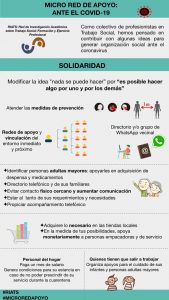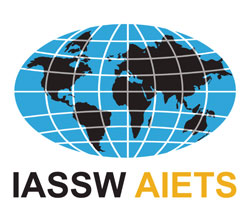Physical distancing, social proximity and collective organization: A proposal from social work to respond to COVID-19, in Mexico
Prepared by
Red de Investigación Académica sobre Trabajo Social: Formación y Ejercicio Profesional/ Academic Research Network on Social Work: Training and Professional Practice (RIATS it is the acronym)
In Mexico, as in the rest of the world, the expansion of the COVID-19 pandemic has generated multiple changes in the different dimensions of daily life. The called “social distance” by the health authorities and confinement could have negative social effects such as rejection, discrimination, violence, stigmatization, and others.
It is in this context, as members of the Academic Research Network on Social Work: Training and Professional Practice (RIATS), located in Mexico, that we have proposed a dissemination strategy to promote the organization of local micro-support networks, emphasizing the strengthening of social ties,  organization and solidarity. For this, a series of infographics were prepared, and subsequently disseminated through the Facebook page of our Association (https://www.facebook.com/RIATS.TS) and from there we share them on our own social networks.
organization and solidarity. For this, a series of infographics were prepared, and subsequently disseminated through the Facebook page of our Association (https://www.facebook.com/RIATS.TS) and from there we share them on our own social networks.
The premises that have supported our digital intervention can be summarized as:
- Emphasize that although it is necessary to maintain a distance, to avoid contagion, it must be physical, but not social. We believe that the other has great importance in the collective welfare, and that now is necessary to strengthen ties of closeness and trust. For this reason, we proposed forms of organization based on mutual support.
- The micro intervention space is the most suitable to operate these networks, given the impossibility of coexisting in large groups, but also because we consider it to be the best strategy to organize more effectively in the environment in which daily interaction takes place.
- Our proposal is focused on all sectors of the population, but emphasizes support for the most vulnerable groups: older people, domestic workers, small merchants, cleaning staff; people for whom, for financial reasons, quitting work is not an option.
The proposal has three dimensions: 1) Informative, which means being aware of the news, ruling out fake news, spreading little-known preventive strategies and maintaining contact with social circles in the immediate environment. 2) Social solidarity, which supposes that self-care also protects others from contagion; support those who need it most, providing support that allows them to continue with their daily activities and, 3) Improvement of daily coexistence, foreseeing that confinement may generate some conflicts and relational tensions, given the extension of the times of coexistence during the contingency.
As a group of social workers, we recognize that, although these measures are not sufficient and that the government and corporations have to do the same, we are convinced that our professional knowledge about interactions and social processes is essential in situations of social emergency. Furthermore, if we successfully multiply these micro-support networks, they will surely be able to contribute to improve some situations in vulnerable groups and people, at the same time that society does its part.
A proposal from social work to respond to COVID-19, in Mexico Una propuesta desde trabajo social ante el COVID-19, en México


